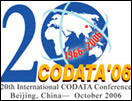|
||
|
Keynotes Key Sessions Contributed Sessions ------------ Scientific Program and Abstracts ------------ Proceedings Submission Instructions
|
20th International CODATA Conference
Scientific Data and Knowledge within the Information Society 22-25 October 2006, Beijing Keynote: |
|
|
Jane Lubchenco [ PDF Presentation ] [ PPT Presentation ] Abstract Scientists bear multiple responsibilities, to society and to themselves. One obvious responsibility is to discover new knowledge, and to do so in an ethical fashion. In addition to advancing scientific frontiers, scientists have another primary obligation: sharing their knowledge with society. All too often scientists have communicated primarily or exclusively with other scientists, via the peer-reviewed literature, scientific conferences or the internet. Although scientist-to-scientist communication is essential for the progress of science, it is equally important that scientists communicate their findings and knowledge to society at large. Scientific understanding should inform decision-making, but it cannot do so if decision-makers do not know about or understand the relevant scientific information. (The term “decision-makers” is used in the broadest sense, to include individual citizens, policy makers, resource managers, communities, businesses and industry, and government.) Different skills are required for communication to the public vs to other scientists. Lack of understanding of scientific information is currently a very significant impediment to progress around the world. Scientific knowledge should not dictate policy or other decisions, but it should inform them. The scientific community at large, but the academic community in particular, has an obligation to redirect its efforts to improve public communication of science. Doing so will require changing the reward structure within academia, creating new programs to teach scientist how to communicate with non-technical audiences, and allowing time for communication activities. If the scientific community does not make its knowledge understandable, relevant and useful, others will attempt to ‘translate’ scientific knowledge into lay language -- but they may do so inaccurately (deliberately or accidentally). Scientific knowledge should not become a political weapon. It is urgently needed to help inform societal decisions. Hence one of the responsibilities of the scientific community is to change the values and reward structure of science and the skill sets of scientists to meet society’s needs and fulfill this obligation. [ PDF Presentation ] [ PPT Presentation ]
|
||
|
|
||
